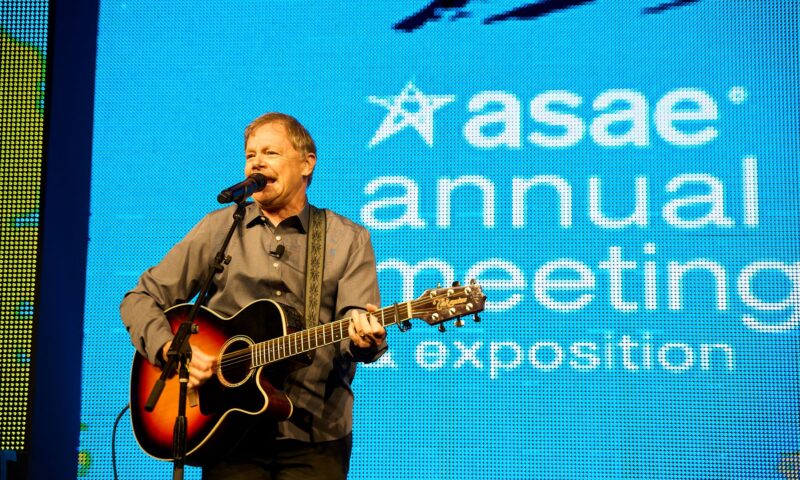
#ASAE22: Disruption Can Lead to Finding Your Authentic Self
Many people and organizations ignore hard issues because addressing them will cause major disruption. During his closing keynote at #ASAE22, Grammy nominee and LGBTQ advocate Cidny Bullens shared his story to show how disruption can help you discover the heart of what matters.
Disruption can feel a little strange. It can feel like something that shouldn’t be spoken, let alone done. But pursuing that feeling of disruption can help identify the core issue you need to address. That was the message of Cidny Bullens, a Grammy-nominated musician and LGBTQ advocate, during his closing keynote on Tuesday afternoon at ASAE’s 2022 Annual Meeting & Exposition.
“When I was told that the theme of this year’s ASAE conference was ‘disruption equals opportunity,’ I thought, ‘Well, that’s perfect for me,’ because it kind of sums up my whole life,” he said. “I am a walking disruption, and I always have been.”
Bullens, a transgender man, remembers at 4 years old telling his mother not to call him Cindy anymore, and to instead call him Bob. His mother told him he was born in the wrong body but wouldn’t call him Bob. This is Bullens’ first memory of sharing his inner feeling out loud, and also provided him with a clear sense that this was disruption.
“Society wants the sexes to be binary—on one side of the gender line or the other,” he said. “I clearly didn’t fit the bill.”
Bullens has spent his life being disruptive, not quite coloring inside society’s lines. Always writing songs and singing as a teen in the ‘70s, Bullens was a huge Elton John fan. Bullens, despite not being a member of the media, crashed a press event and met John. This led to Bullens joining John on tour as a backup singer.
Bullens told attendees that they may recognize his vocals from the song, “Don’t Go Breaking My Heart,” which John recorded with Kiki Dee. “Remember the ‘nobody knows it’ in the background?” he asked as he sang the familiar line from the song. The connection to John led to Bullens’ own musical success, including two Grammy nominations.
“Here’s the thing,” Bullens said. “If I hadn’t walked into that press party uninvited where I knew Elton John was going to be, none of what transpired in the years since would have happened. Disruption equals opportunity.”
Fighting Disruption
Bullens said he spent much of his life in a tug-of-war against the disruption of what his insides were telling him. He hit a career slump after his initial success. Managers wanted him to appear more feminine, wearing tank tops and dangly earrings. “I couldn’t do it. I couldn’t not be me,” Bullens said.
While he rejected trying to look feminine, he still attempted to do what people expected. He married, had two daughters, and moved to Westport, Connecticut.
“I tried to squeeze myself into what life was supposed to look like,” he said. “I loved having children. I loved being a mother, but I wasn’t happy.”
In fall 1995, tragedy hit when Bullens’ daughter was diagnosed with Hodgkin’s disease and died a few months later in March 1996.
The resulting pain and grief were hard for all the obvious reasons, but also because, “in our culture grieving out loud is in itself a disruption.” But that is what Bullens did. He poured out all his grief through song and talked about what it meant to have to live without his daughter, which resulted in the album Somewhere Between Heaven and Earth.
Embracing Disruption
It took Bullens a long time to get to the point where he was ready to embrace his true self, despite the disruption it might cause. In fact, friends warned him not to transition because he could lose half the people in his life.
“The worst thing that could possibly happen to me in my life had already happened,” he said. “Nothing, nothing, nothing can be worse than losing my child. I knew I would be placing a bomb in the middle of my life, but I also knew that I could no longer ignore the core issue of my life: I am transgender.”
Bullens suggested it’s necessary to wade through the fear of losing things to discover that core issue and embrace it—whether as a person or as an association with a mission.
“I knew who I was at 4 years old,” Bullens said. “I knew I was a boy, but contrary to what my mother said, I was not born wrong. I was born me.”
He closed by urging attendees to ask themselves a question: “How far are you willing to go to become who you truly are—all of your true, whole authentic self?”
(Nick Hagen Photography)






Comments